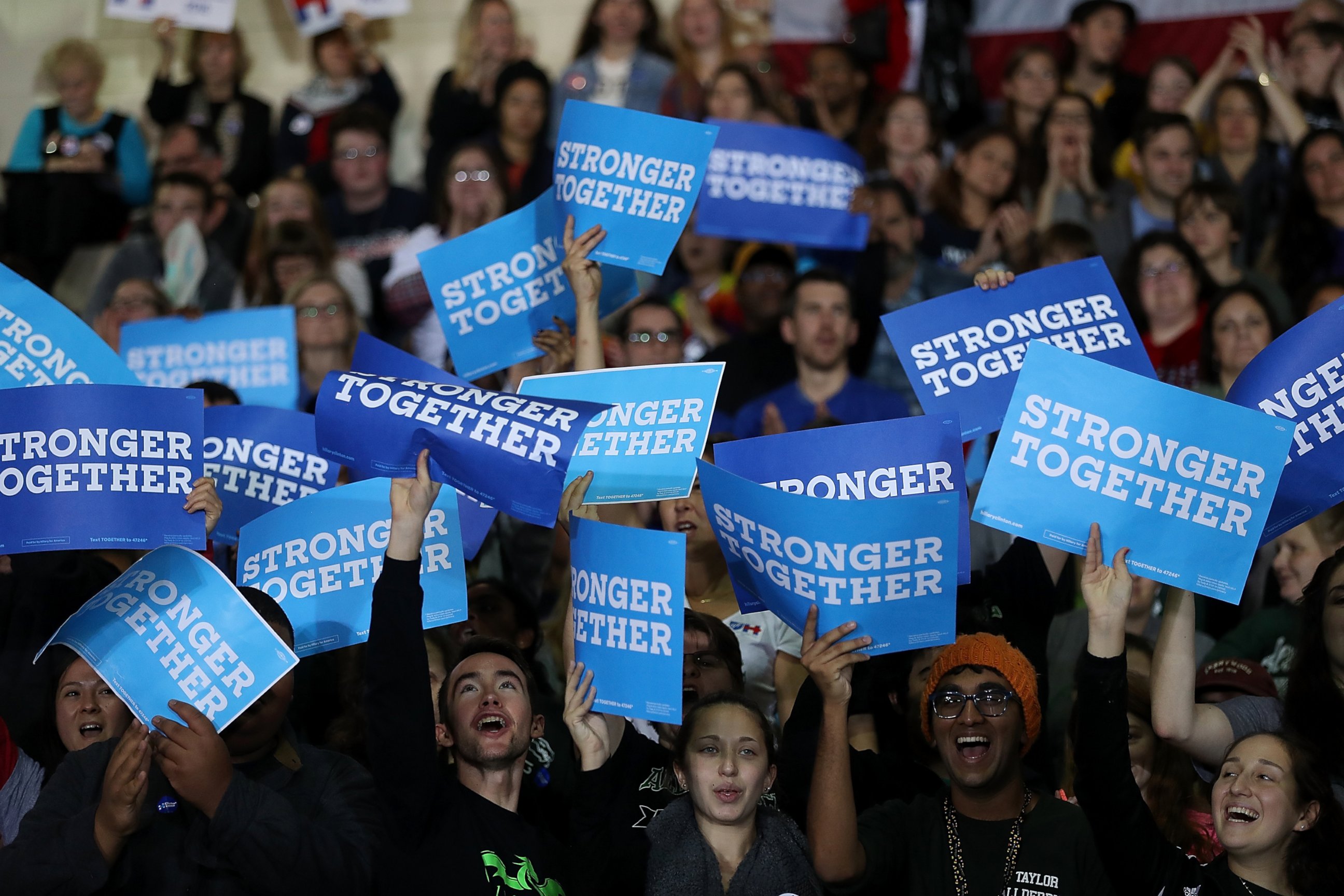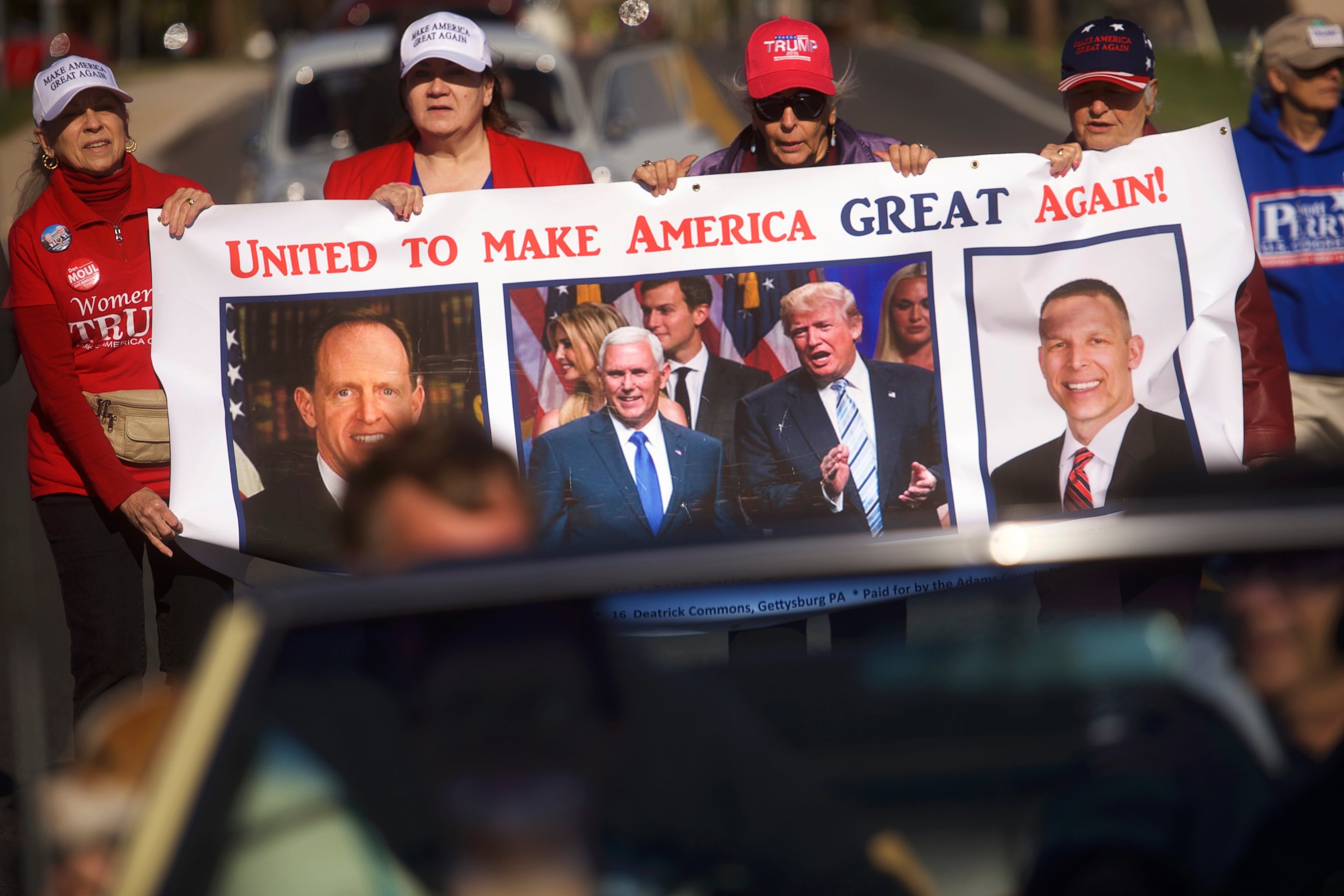In Battleground Pennsylvania, Lines Are Drawn Headed Into Election
ABC News spoke with voters in the Keystone State.
— -- With just days to go until the election, it’s decision time for voters. And in the battleground state of Pennsylvania, the lines are drawn.
In a pre-Halloween “Pumpkins and Politics” tour through Philadelphia and the surrounding suburbs that are pivotal in determining the destiny of the state’s 20 electoral votes, most voters had their minds made up.
For some voters, like longtime Republican Tim Cifelli, the choice between Hillary Clinton and Donald Trump has resulted in choosing neither of the above. Instead, Cifelli has decided to cast a protest vote and write-in his ideal candidates.
“I frankly think [Trump] has hijacked the Republican Party and the party that represents me, but I cannot vote for Hillary Clinton,” Cifelli said. “Rather than being forced to choose one or the other…I am going to write in John Kasich and Paul Ryan, I think they are a better reflection of my view of the party.”
In a discussion with decided voters at Honey’s Sit and Eat Diner in Philadelphia, many voters expressed enthusiasm with their candidate of choice despite a near unanimous expression of disgust with the state of the political discourse.
“I take issue with the lesser than two evils argument. I think Hillary Clinton is a great candidate and will make a great president,” said Jana Korn, a student at the University of Pennsylvania.
“It’s been kind of a rocky roller coaster ride,” Linwood Holland, a Trump supporter and African-American who lives in Philadelphia and serves at the city’s 35th ward leader.
“I’ve dealt with a lot of people I’ve known for a lot of years and because of my positions I’m not sure if we’re going to be friends after the election,” he continued. “People have taken the election so personal.”

LeShawna Coleman, a Clinton supporter and teacher who works in Philadelphia’s inner city schools, described the election discourse as “appalling.”
“As a teacher, as a parent, I teach my students I teach my daughter to be inclusive,” said Coleman, who is an African-American. “And to make comments like Muslims can’t come in and these people are bad because they’re Mexican, etc., those aren’t the kind of values we want our children seeing in this election.”
Korn said it’s been difficult to watch the way the issue of sexual assault has played out from the stump in recent weeks.
“Having a presidential candidate get up on stage and talk about sexual assault as 'locker room talk' was scary,” said the college student, who noted that this issue hits close to home. “We already have a problem where women do not feel safe talking up after they’re sexually assaulted and it should be the role of the leaders in this country to be making them feel comfortable and not silencing their voices.”
Lisa Riley, a Republican who is enthusiastically supporting Trump, comes to Trump’s defense over the now infamous recording in which Trump bragged about being able to grab women’s genitalia, in part by pivoting to the scandals in the Clintons’ past.
“I don’t condone anything he said but they were in a private conversation and at the time he wasn’t running for president,” Riley said. “Meanwhile you have a woman who stood by her husband as he was getting sexual favors in the White House. People are saying she’s so great, she’s so strong, that doesn’t sound like a strong woman to me.”
While many view 2016 as the nastiest campaign season they’ve seen in their lifetimes, a Benjamin Franklin impersonator in historic Philadelphia brought some historical perspective to the current cycle.
“If I told you the vice president of today actually had a quarrel, if you will, with one of his enemies and then he actually challenged them to a duel and they each had a pistol and the vice president of today actually shot this gentlemen and the gentlemen passed away,” said Franklin re-enactor Rob DeVitas.
“This actually happened,” he continued. “Aaron Burr, the vice president to Thomas Jefferson, while he was vice president, had the famous duel with [Alexander] Hamilton.”
While the 2016 campaign has not devolved to physical dueling, one real issue that Philadelphia has had to grapple with is concerns – and claims -- of voter fraud.
“With the supercharged atmosphere around the election it makes it hard for people to see straight,” said Republican City Commissioner Al Schmidt in an interview with ABC News.

Trump has repeatedly warned about the potential for voter fraud specifically in Philadelphia. And though Schmidt would not respond to Trump’s specific claims, he urged perspective in looking at the real problem of voter fraud compared to election rigging.
“Voter fraud does occur in Philadelphia, just as it does all over the country but there’s a big difference between cases of voter fraud and vote rigging, systematic, rampant voter fraud which would presumably require a conspiracy of hundreds of people and nobody finding out about it that would be pretty extraordinary,” he said.
While Schmidt said there have been 10 indictments on voter fraud in Philadelphia in the last couple of years, he said there is no evidence of widespread problems.
So where did the concerns over voter fraud in Philadelphia come from?
One specific case when speculation swirled of fraud came in the 2012 election when 59 districts in the city saw not one single vote cast for Republican nominee Mitt Romney.
Schmidt, who was commissioner at the time, investigated the case at the time and found that no fraud had occurred.
“I went around the city to each of these different precincts to find these people and did somebody at least claim they cast a vote that wasn’t counted and we couldn’t find a single person where that happened,” he said.
Part of the explanation, Schmidt explained, is that many of the city’s precincts are very small, even sometimes consisting of just one building. Secondly, he explained that Pennsylvania’s voting machines are such that votes cannot be subtracted from the machine once they are cast, making it impossible for cases of fraud to occur through the subtraction of votes for any given candidate.
ABC News' Gary Westphalen contributed to this report.




